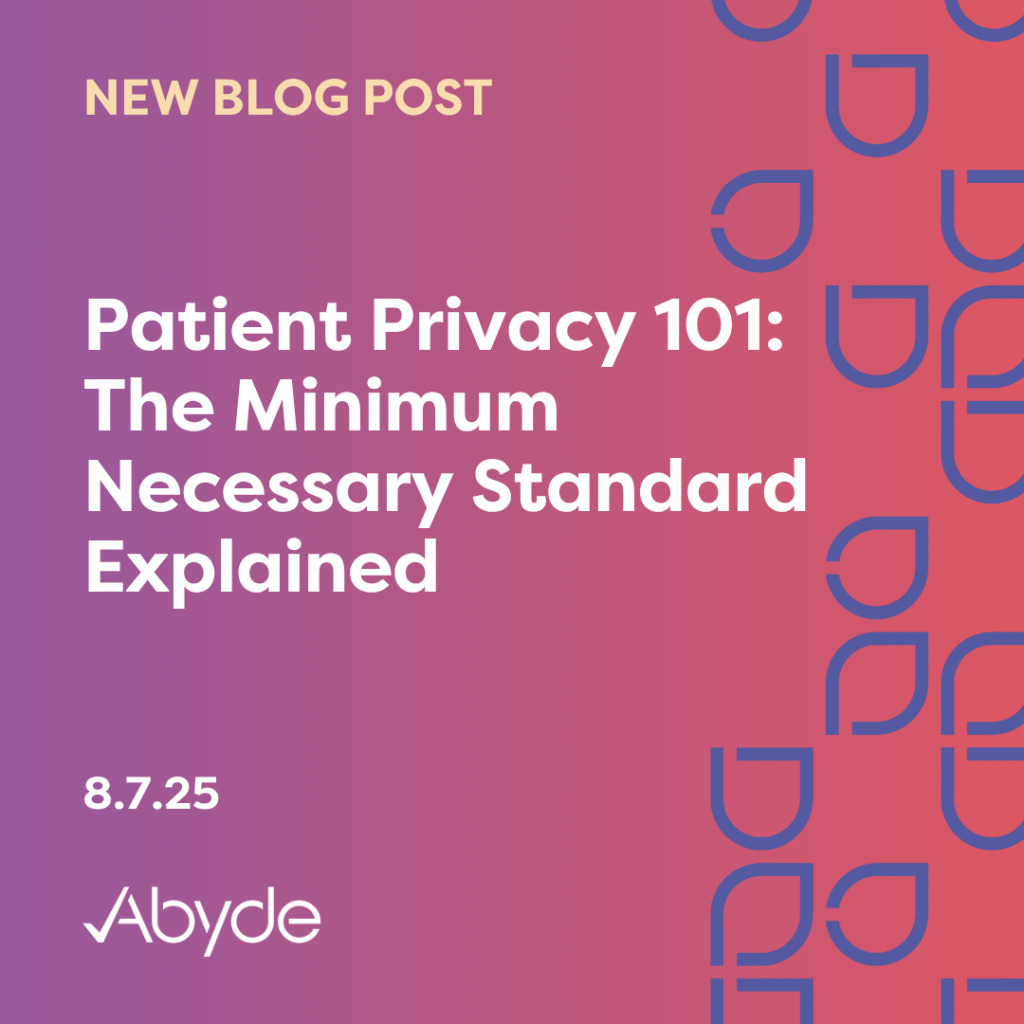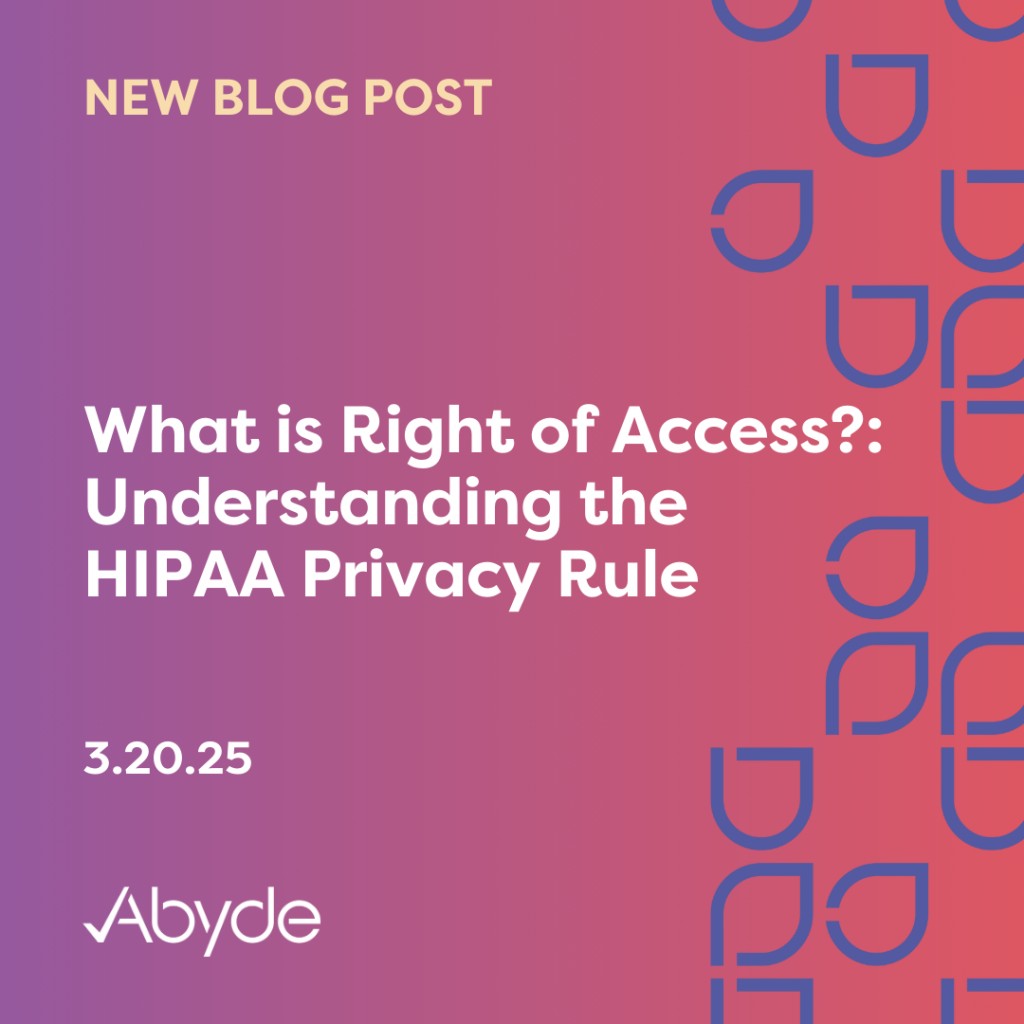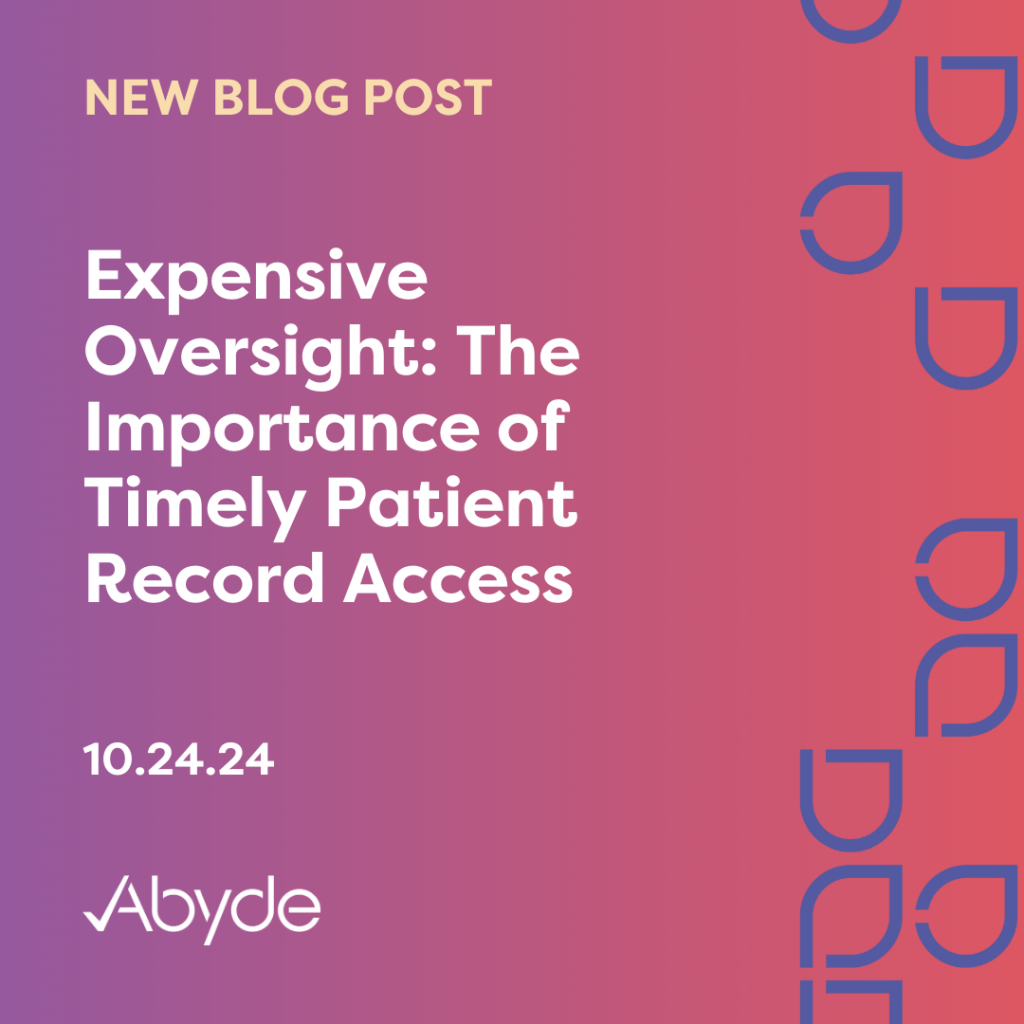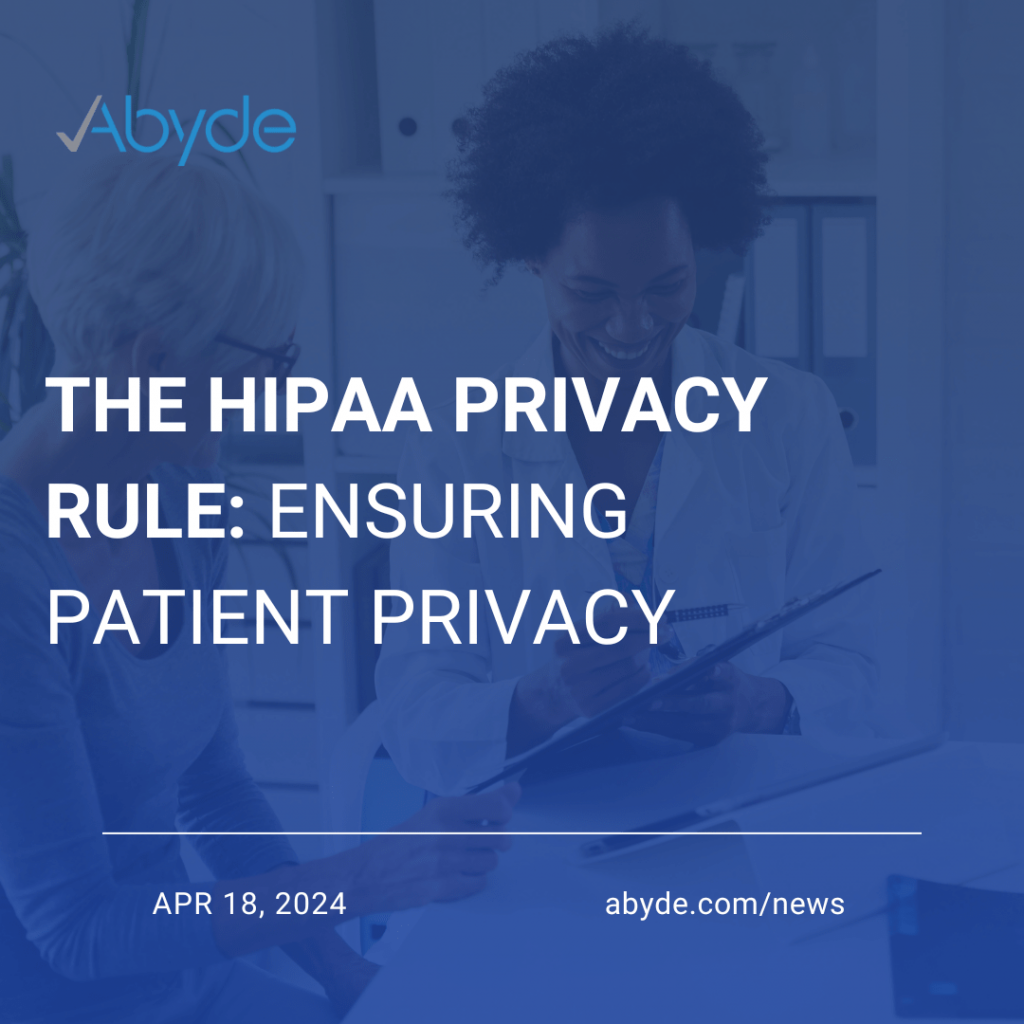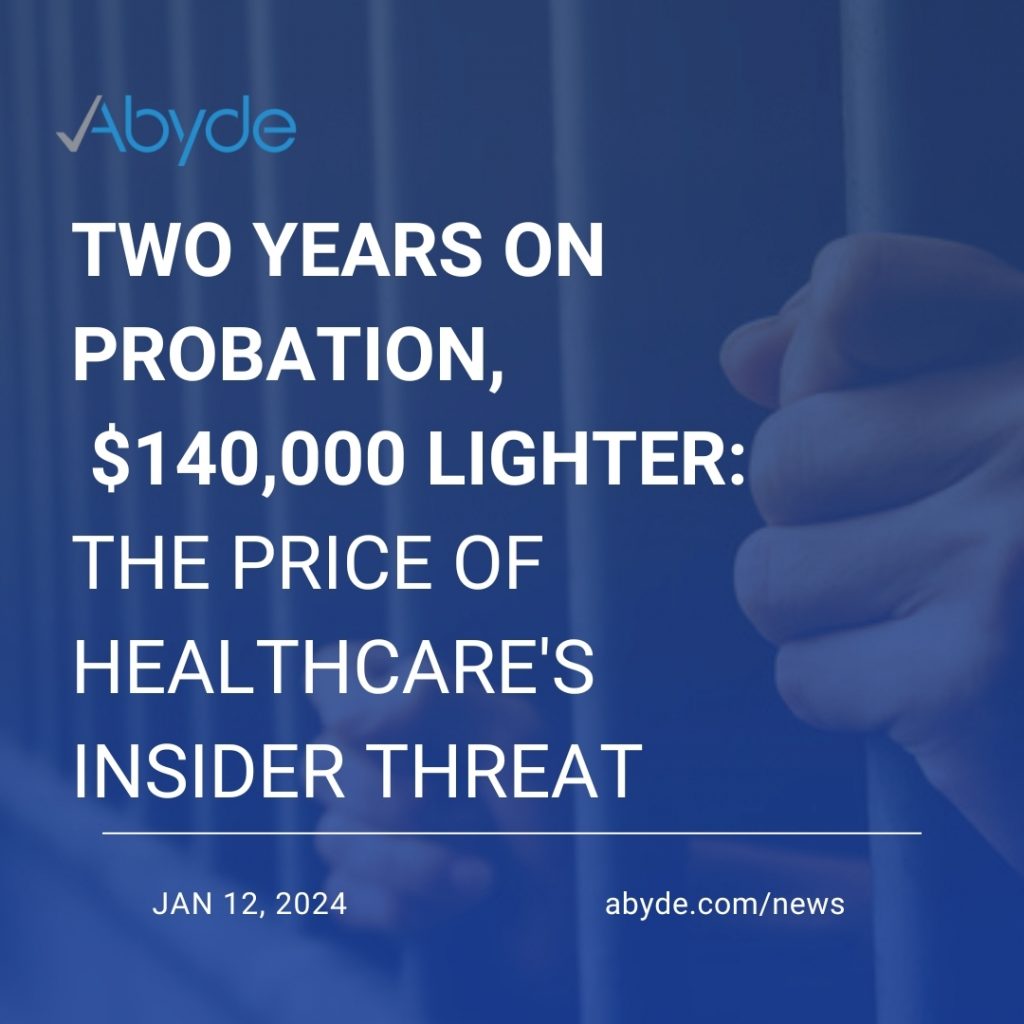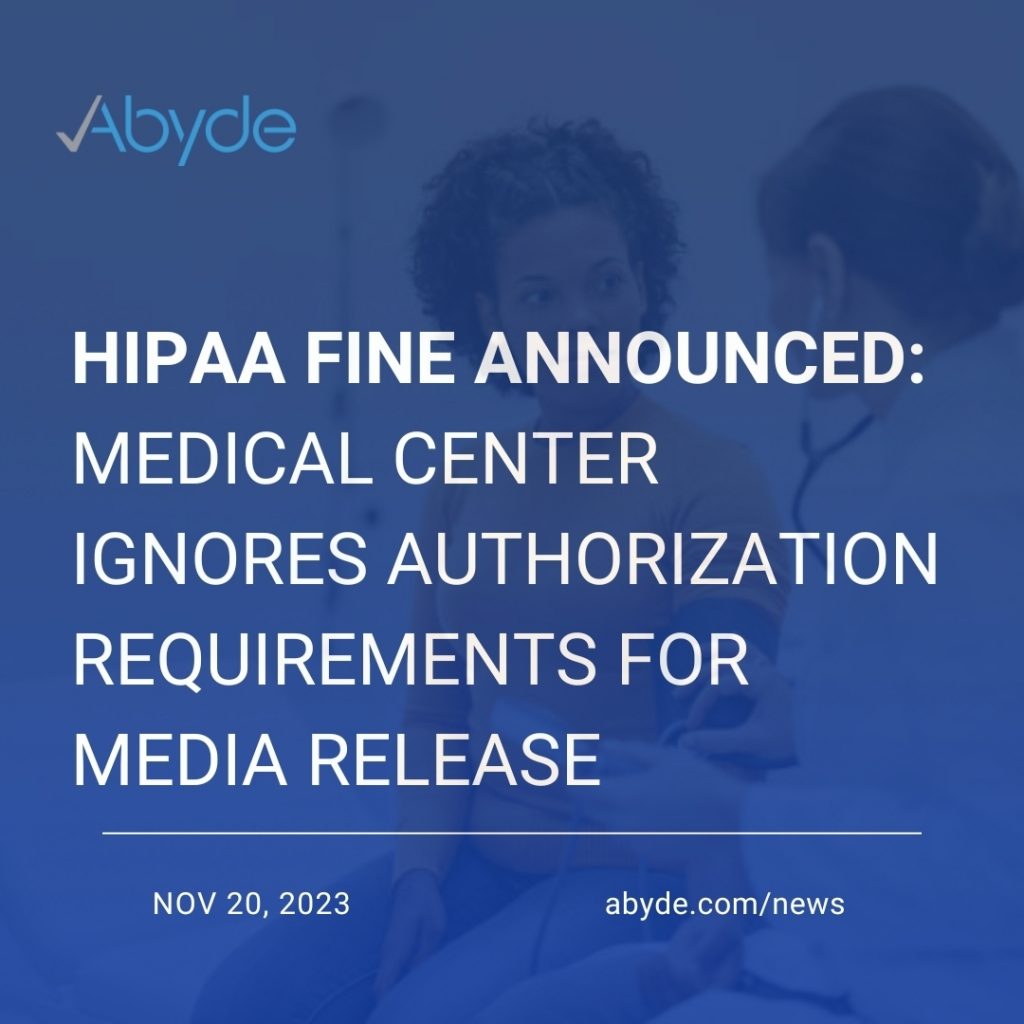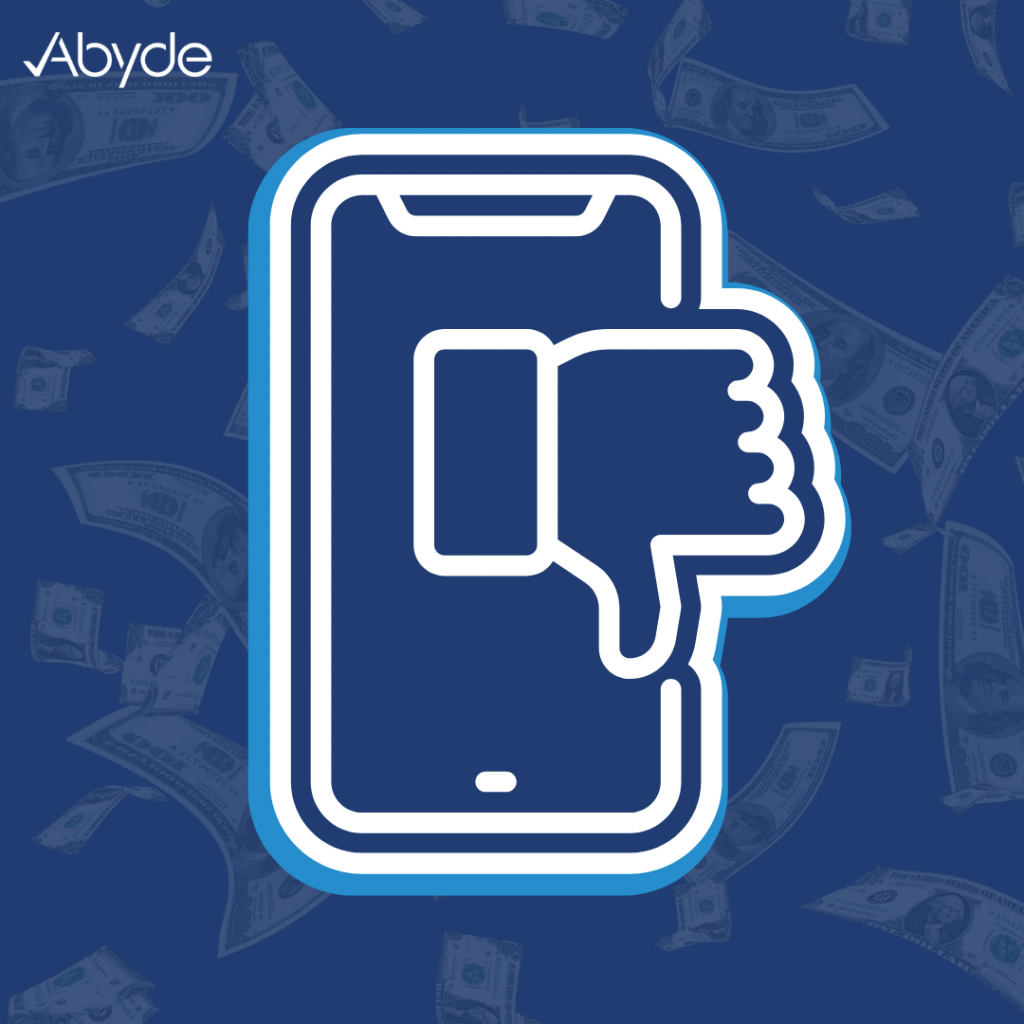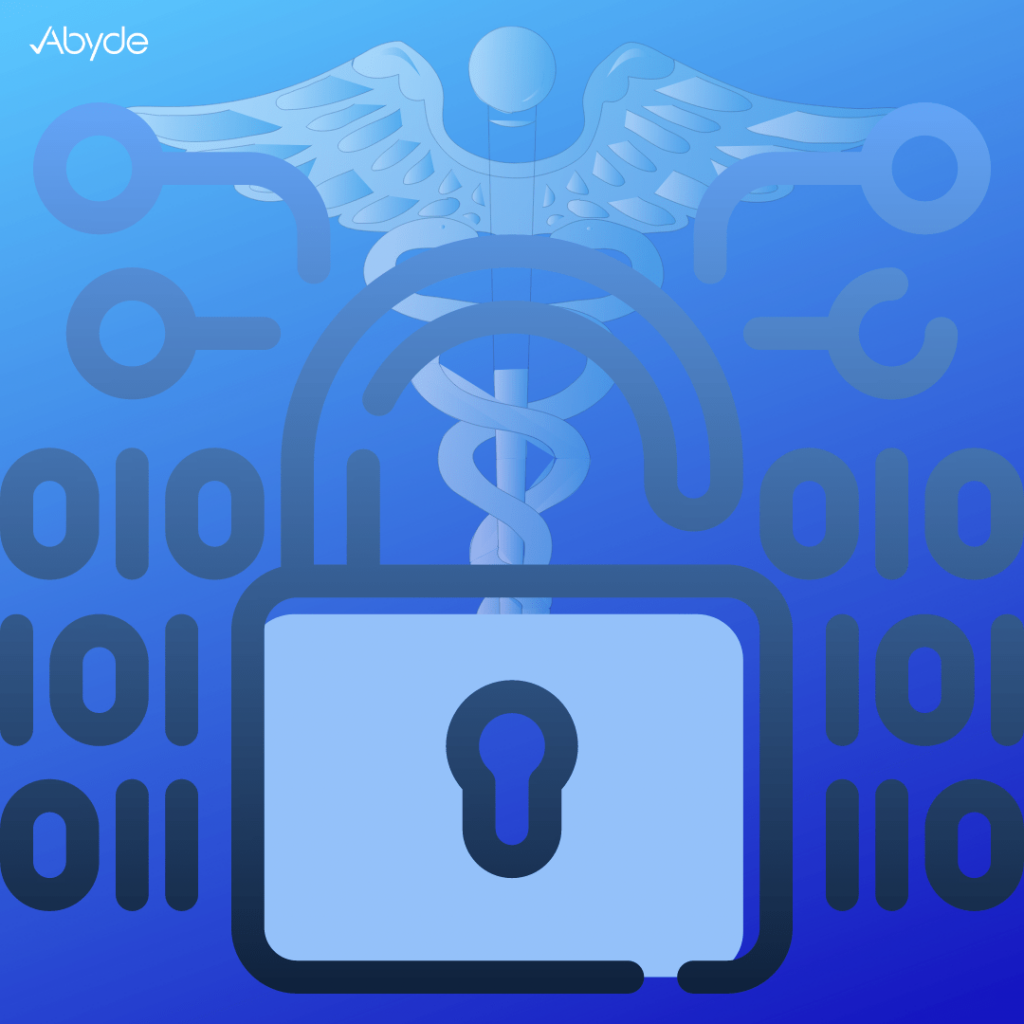October 27, 2025 Imagine a scenario that’s played out at your practice a million times: a patient calls and asks for a copy of their medical records. Simple, right? Believe it or not, what seems like a routine request can quickly become a compliance risk if your employees misunderstand timelines, allowable fees, or who’s allowed to access certain information. With over 50 penalties and millions of dollars in fees issued by the Office for Civil Rights due to Right of Access violations, your practice has a responsibility to understand its role when handling patient requests. By acknowledging your practice’s duties and properly training your staff, you can empower your team to deliver documents in a timely manner that still protects sensitive data. Right of Access 101 Right of Access, established in the HIPAA Privacy Rule, gives patients the right to receive their records within 30 days of the initial request. Depending on the state, the number of days your practice has to fulfill requests may even be less. For example, California legislation requires that patient requests be upheld within 15 days. This timeline is strict and can only be extended once for an additional 30 days. So, once you receive a request, it’s go time. Before the staff gathers anything, the first question is, how should these records be sent out? Even if the request comes through a secure portal, your staff must encrypt any Protected Health Information (PHI) sent electronically. Certified mail is recommended for safe and trackable delivery if the patient requests a physical copy. Now, what can you charge to deliver these records? Patients have a right to their health records, and any associated costs must be minimal to remain HIPAA compliant. According to the OCR, a flat fee of $6.50 for all requests for copies of PHI maintained electronically. Additionally, ensure that thorough documentation, like a current HIPAA consent form, is in place if the requester is not the patient themselves. Keeping Your Practice Compliant So, think back to the scenario we mentioned earlier. Only now, you don’t have to stress! Your team is trained and aware of their responsibility to fulfill patients’ requests. Your patients get what they want, and even better, your practice avoids thousands of dollars in fines and reputational damage. Quickly and compliantly addressing patient requests promotes patient satisfaction and can help your practice avoid thousands of dollars in fines and reputational damage. The proper software solution centralizes all documentation, policies, forms, and training related to Right of Access. This cloud-based hub provides easy access for everyone in your practice, giving staff the tools they need to be successful. To learn more about Right of Access in your practice, meet with a compliance expert today.
Patient Privacy 101: The Minimum Necessary Standard Explained
August 7, 2025 Under HIPAA, healthcare practice staff must keep a secret. This means everyone with access to patient data, from doctors to receptionists, can’t share any information about a patient. While it might feel enticing for a nurse to tell their friends about an old high school bully coming into their practice with a rash, and revenge might feel sweet, it’s a total HIPAA no-no. One of the pillars of HIPAA is the Privacy Rule, which dictates when and if Protected Health Information (PHI) can be shared. The Privacy Rule keeps patient data secure and allows the best care, with patients knowing their information will remain confidential. However, sometimes information needs to be shared. This is where the Minimum Necessary Standard comes in. With this rule, healthcare providers and their Business Associates can share PHI if it’s vital to complete work tasks. Safeguarding confidential information upholds the integrity of your practice and allows patients to feel comfortable when addressing health concerns. Your practice must follow HIPAA to keep patient data safe and secure. What is the Minimum Necessary Standard? All in the name, the Minimum Necessary Standard defines how HIPAA-regulated entities can share information. Depending on the situation, more information might be warranted to be shared compared to others. The easiest way to explain the HIPAA Minimum Necessary Standard is to compare it to ordering pizza. When you order a pizza for delivery, you only provide the minimum necessary information: your name, what you want to eat, and your address. You wouldn’t share details like what you ate for breakfast or the names of everyone in your house because that information isn’t needed for the delivery. In a healthcare setting, while not as cheesy, the same principle applies. A front-desk receptionist, for example, needs access to a patient’s basic information to confirm an appointment. They don’t need access to the patient’s full medical history. The minimum information required for their job is scheduling and patient identification, not the patient’s back surgery details. The HIPAA Minimum Necessary Standard ensures that everyone, from the front desk to doctors, to even your vendors, can only access the PHI they absolutely need to do their job. In some situations, more information can be shared more easily. These exceptions include disclosures for treatment purposes, such as when a doctor needs a patient’s complete medical history to provide proper care. Your practice can share PHI with the patient directly, or someone with explicit authorization from the patient, or in a public emergency. Finally, disclosures may also be required by law. Simplifying the Minimum Necessary Standard Your staff must uphold the security of PHI. By following the HIPAA Privacy Rule, you stay compliant and build a successful practice. When patients feel confident that their records are safe, they’ll trust you and feel empowered to choose your practice. It’s a serious responsibility. With the right solution, staff can be appropriately trained to handle health records. Smart software can streamline training for your practice and provide dynamically generated policies and procedures for all staff to access and review whenever they have a question regarding the use of PHI. Meet with a compliance expert today to learn more about protecting your practice and patients.
What is Right of Access?: Understanding the HIPAA Privacy Rule
March 20, 2025 HIPAA is often misunderstood as only addressing the security of medical information. However, it encompasses more than that. The Health Insurance Portability & Accountability Act also defines how medical information must be shared with patients through the Privacy Rule. This highlights another key responsibility healthcare providers must be accountable for. Alongside the Security Rule and the Breach Notification Rule, the Privacy Rule provides patients additional rights regarding how their medical records are handled. The Privacy Rule created the Right of Access, requiring practices to provide patients with their medical records in a timely manner. With the latest fine for HIPAA being a Right of Access violation, it’s vital for practices to be aware of this requirement and how it pertains to the care they provide. What is Right of Access? Right of Access gives practices 30 days to fulfill a patient’s request for their records. In some situations, these thirty days can be extended to an additional 30 days, but that is the longest period of time allowed to provide a patient with their records. This is a federal requirement, but the timeline could be even shorter depending on where the practice is located. For instance, if the practice is in California, staff must provide patients with medical records within 15 days. Your practice can charge for medical records, but it needs to be reasonable. The Office for Civil Rights (OCR) defines this as the average cost of supplies, limited labor, and postage when providing medical records to a patient. However, instead of calculating this cost, the OCR also suggested a flat fee not to exceed $6.50 when handling electronic records. Once again, other guidance can be levied on the state level, like California’s cap on the cost of medical records at 25¢ a page plus a reasonable clerical fee. From the moment a practice receives a request, it must be addressed quickly. Staying on top of these requests is crucial for staying compliant and maintaining patient satisfaction. How to Stay Compliant While this might seem simple, many practices have been fined in the past for violating this right of patients. In 2024 alone, Right of Access fines accounted for nearly $500,000. The OCR introduced a Right of Access Initiative to ensure that these patient requests are taken seriously. Many of these investigations and fines stem from patient complaints, showing the importance of complying with this HIPAA component. Utilizing smart software solutions can assist your team in ensuring that all staff members are aware of their responsibilities when handling PHI, including the responsibility to address patient requests quickly. This empowers your team to take accountability and keep patients happy. To learn more about how to comply with HIPAA Right of Access legislation, meet with our team of compliance experts today.
Expensive Oversight: The Importance of Timely Patient Record Access
October 24, 2024 There has been a flurry of HIPAA fines in the past few weeks, with over half a million dollars levied in the last month. Just one example is Gums Dental Care, LLC, a small dental practice in Maryland that was fined for a Right of Access violation. Right of Access violations, which involve failing to provide medical records in a timely manner, are a common HIPAA mistake. Another violation for this was issued in August. What Happened? A patient requested her medical records from Gums Dental on April 8, 2019. After not receiving them, she issued a complaint to the OCR in May 2019. The OCR contacted Gums Dental Care for technical assistance and believed the case was over. This was just the beginning. This case spanned years, with a second complaint filed in August 2019 and the OCR sending several data requests through letters and calls to Gums Dental. On October 1, 2020, the OCR sent Gums Dental a proposed resolution agreement and corrective action plan. At the end of the month, Dr. Gumbs wanted to present her case in front of a judge, believing the patient would commit Medicaid fraud with her records. She also said that the complainant didn’t pay a $25 administrative fee to release the medical records through mail. First, patients should always have access to their medical records, regardless of their reasons. Second, the fee would be waived if the patient requested it digitally, not through mail. In December 2020, the OCR issued a Letter of Opportunity to Gums Dental. At the beginning of the next year, Dr. Gumbs once again justified her refusal to provide the records since she believed her patient would commit a crime with them. She also believed her website wasn’t secure enough to send them digitally. However, Gums Dental didn’t attempt to send the records at all. By the time the Notice of Proposed Determination was sent in March 2022, roughly three years after the first medical record request, Gums Dental faced a Civil Monetary Penalty fine as high as $7,676,692. However, the OCR ultimately levied a $70,000 fine, recognizing the smaller size of the dental practice. How to Protect Your Practice Common HIPAA fines often involve Right of Access violations. At the federal level, practices are required to provide patients with their medical records within 30 days, and some states have an even shorter timeline. Navigating these unique regulations can be challenging, so having an intelligent solution is crucial. Smart software can streamline compliance for your practice by generating policies and procedures tailored to your needs. These solutions also include access to a team of compliance experts who can help answer your questions and ensure that you are interacting with patients in a HIPAA-compliant manner. To learn more about software solutions, with a compliance expert here.
The HIPAA Privacy Rule: Ensuring Patient Privacy
April 18, 2024 Healthcare records can be pretty personal. That’s why it only makes sense that this Protected Health Information (PHI) needs to be secure, giving patients peace of mind. That’s where The HIPAA Privacy Rule comes in. While you already know that a patient’s health information shouldn’t be shared like the latest gossip, you might wonder what this broad rule actually entails. Let’s uncover it together! What is the Privacy Rule? The HIPAA Privacy Rule establishes the standards to protect the privacy of PHI, limiting how information can be shared, and setting patients’ rights regarding their PHI. HIPAA, and all of its rules, need to be followed by Covered Entities and Business Associates (BAs). Now, let’s break that down. Keep it Brief Here’s a simple anecdote: When you’re ordering a pizza, you only give them your address and phone number, not your entire life story. Well, that’s similar to this section of the Privacy Rule, but instead of a perfect, extra cheesy pizza, it’s medical information. Within the Privacy Rule, there is the Minimum Necessary standard. As in the name, this means to only provide the minimum necessary PHI for an intended purpose. Sharing PHI needs to be for the benefit of the patient. This rule ensures healthcare providers only share the essential bits of your health information to get the job done. However, there are a few times when the Minimum Necessary standard does not apply: By providing limited PHI, you establish trust and confidence with your patient, knowing that their information is secure, and when it’s shared, it’s for an important reason. Right to Medical Records As a part of the Privacy Rule, patients have the right to their medical records. This is known as the Right of Access. HIPAA gives patients the key to their medical records. This requires practices to give medical records to patients in a timely fashion, give patients the option to request to fix errors in the medical records, and copies of their records for free, or at a reasonable cost. While HIPAA considers this ‘timely fashion’ to be within 30 days, some states are even sooner! The Right of Access rule has been at the root of the past two OCR fines, highlighting the monetary penalty that can come with not providing patients (or authorized caretakers) medical records quickly. How Abyde Can Help Hopefully, we didn’t lose you after that HIPAA rundown! That’s where Abyde can help. Abyde streamlines the compliance process, turning complicated legislation into intuitive software that keeps you in check when it comes to compliance. We even make the process easy. Our plethora of resources will keep you educated and on top of everything compliance. To learn more about what your practice or business needs schedule an educational consultation today. Schedule here for Covered Entities and here for Business Associates.
Two Years on Probation, $140,000 Lighter: The Price of Healthcare’s Insider Threat
January 12, 2024 Two Years on Probation, $140,000 Lighter: The Price of Healthcare’s Insider Threat A former healthcare executive in Kentucky has been sentenced to probation and ordered to pay restitution after admitting to disclosing patients’ protected health information (PHI) in violation of HIPAA. This case highlights the ongoing threat of insider data breaches in the healthcare industry and the importance of strong data security measures. The Case: Mark Kevin Robison, a former vice president at Commonwealth Health Corporation (now Med Center Health), pleaded guilty to knowingly disclosing PHI of patients under false pretenses to an unauthorized third party between 2014 and 2015. While details of the unauthorized disclosure remain unclear, the incident underscores the potential harm caused by insider data breaches within healthcare organizations. Avoiding Jail, Facing Consequences: Despite facing a potential five-year prison sentence and a $100,000 fine, Robison’s plea deal secured him two years of probation and a $140,000 restitution to the hospital. Half of the restitution has already been paid, and Robison is expected to cover the remaining amount by the end of January. Lessons Learned: The Robison case serves as a stark reminder of the importance of data security in healthcare. Healthcare organizations must: Insider Threats Remain a Challenge: While HIPAA violations by external hackers often grab headlines, insider threats like the Robison case pose a significant and often underestimated risk. Healthcare organizations must prioritize data security measures that take into account both external and internal threats. Looking Ahead: This case should serve as a wake-up call for healthcare organizations to redouble their efforts to protect patient data. By prioritizing data security and creating a culture of compliance, healthcare providers can help ensure that patients’ personal information remains safe and secure. To learn more on how to ensure your practice is compliant, email info@abyde.com and schedule an educational consultation.
HIPAA Fine Announced: Medical Center Ignores Authorization Requirements for Media Release
November 20, 2023 In recent news, the U.S. Department of Health and Human Services (HHS), Office for Civil Rights (OCR) settled a HIPAA investigation with Saint Joseph’s Medical Center over the unauthorized disclosure of COVID-19 patients’ protected health information (ePHI) to a national media outlet. This incident underscores a critical lesson in patient privacy, prompting Abyde to emphasize the significance of obtaining patient authorization before releasing any ePHI or images. See, What Had Happened Was Saint Joseph’s Medical Center, a non-profit academic medical center in New York, faced potential violations of the Health Insurance Portability and Accountability Act of 1996 (HIPAA) Privacy Rule. The center improperly disclosed sensitive patient information to a national media outlet without obtaining the necessary written authorization from the patients, leading to a settlement with the OCR. The Importance of Patient Authorization The OCR makes it clear that patients have the right to control the disclosure of their health information. This settlement highlights the need for healthcare providers to prioritize patient authorization before releasing any ePHI or images, particularly to the media. Abyde’s Take When undergoing medical treatment in medical facilities, patients should feel assured that their healthcare providers will not disclose their personal health information to the media without obtaining proper authorization. Abyde cannot stress enough the responsibility of healthcare providers in safeguarding patient privacy. Key Takeaways: Our Final Word The settlement with Saint Joseph’s Medical Center serves as a valuable lesson for healthcare providers everywhere. Abyde remains committed to supporting practices in navigating the complexities of HIPAA compliance, with a specific emphasis on the importance of obtaining patient authorization before disclosing any ePHI or images. To see why Abyde is considered the pre-eminent HIPAA compliance solution, click here to schedule a demo.
New Jersey Doctor Fined $30k for Breaching HIPAA in Responses to Negative Google Reviews
June 5, 2023 The U.S. Department of Health and Human Services (HHS) launched an investigation into Manasa Health Center LLC’s (Mansa) compliance with the The Health Insurance Portability and Accountability Act of 1996 (HIPAA) Privacy Rule and notified them about it on November 18, 2020. Manasa is a psychiatric practice based in Kendall Park, New Jersey. As a covered entity under HIPAA, Manasa is required to comply with these rules. The investigation uncovered certain conduct, referred to as “Covered Conduct,” which includes the illegal disclosure of four patients’ protected health information (PHI) in response to negative reviews on Google. Additionally, Manasa was found to have failed to implement policies and procedures regarding PHI that comply with the standards and requirements of the Privacy and Breach Notification Rules. Manasa has agreed to pay HHS a resolution amount of $30,000. The payment will be made on the effective date of the agreement, following written instructions provided by HHS. Manasa has also committed to complying with a Corrective Action Plan (CAP) that serves as a roadmap for Manasa to rectify its non-HIPAA-compliant practices. The CAP put in place includes implementation of compliance policies and procedures, employee trainings, breach notifications, reports. Abyde’s HIPAA Compliance Software Solution can help healthcare providers effortlessly assess risks, implement necessary policies and procedures, and receive continuous support to maintain compliance with HIPAA regulations. If you have staff that has a bad case of keyboard-itis, make sure they are trained on what NOT to type out on the internet! By utilizing Abyde, healthcare providers can rest assured that they are meeting the requirements of the Privacy, Security, and Breach Notification Rules. This proactive approach to compliance helps them avoid the potential consequences of non-compliance, such as costly settlements like the one experienced by Manasa Health Center.
HIPAA Violations Unveiled: Examining Critical Breaches of Patient Privacy
May 30, 2023 We always talk about how important it is to set protocols to avoid HIPAA violations, but what exactly are you avoiding? The sobering examples of HIPAA violations are essential to be aware of so that you understand the gravity of safeguarding patient privacy and maintaining the trust placed in healthcare providers. Incidents serve as stark reminders of the profound consequences that can arise when personal health information falls into the wrong hands. These violation examples underscore the utmost importance of HIPAA compliance and the ethical imperative to protect patients’ privacy. Digital Data Disaster A healthcare organization falls victim to a malicious cyberattack, compromising its entire database of patient records. Personal information, medical histories, and even Social Security numbers are exposed, leaving thousands of individuals vulnerable to identity theft and potential harm. This incident serves as a critical reminder that cybersecurity measures must be robustly implemented to protect patient data from the ever-evolving threats lurking in the digital realm. Gossip Gone Wrong A trusted healthcare provider carelessly discusses a patient’s confidential medical condition with their friends during a casual gathering. This “meaningless” gossip spreads to an acquaintance of the patient, eventually getting back to said patient. The careless discussion that violated the patient’s right to privacy ends up in the papers. The patient is beyond embarrassed and the healthcare provider is in for a whirlwind of hurt including reputational carnage. This ever-so-cautionary tale accentuates the importance of professionalism and the duty to keep patient information strictly confidential. Insider Trading In a breach that shakes the foundation of trust, a trusted employee intentionally accesses patient records without a valid reason. Driven by curiosity or malintent, they betray the ethical responsibilities bestowed upon them. This particular violation underscores the significance of stringent access controls, regular auditing, and thorough background checks to maintain the integrity of patient information. Misdirected Medical Records A healthcare provider accidentally sends a patient’s medical records to the wrong individual. This innocent mistake exposes sensitive information to an unintended recipient, potentially compromising the patient’s privacy and causing emotional distress. This incident serves as a reminder of the importance of proper verification processes, double-checking recipient details, and implementing secure methods for transmitting confidential information. Disappearing Device A healthcare professional’s misplaced or stolen mobile device, containing unencrypted patient data, becomes a ticking time bomb. The consequences of the lost, unprotected device could be severe – ranging from identity theft to blackmail or even unauthorized disclosure of personal health information if caught in the wrong hands. This emphasizes the need for strong device security measures, including encryption, remote wiping capabilities, and constant vigilance when handling portable devices. In conclusion, HIPAA violations demand our utmost attention and respect for patient privacy. The examples here demonstrate the real-world implications of breaches in healthcare data security. As individuals and organizations, we must prioritize robust safeguards, ongoing training, and strict adherence to HIPAA guidelines to ensure the protection of sensitive patient information. Let Abyde unite our efforts to safeguard healthcare information and “Abyde” by HIPAA laws.
Fool me once, shame on you… Fool me twice, here’s a Corrective Action Plan
December 16, 2022 On Wednesday, the HHS Office for Civil Rights announced a settlement with a California dental practice over impermissible disclosure of patient-protected health information (PHI). The practice faces potential violations of the HIPAA Privacy Rule by inappropriate use of social media to respond to patient reviews and disclosing protected health information. OCR Director, Melanie Fontes Rainer, stated, “This latest enforcement action demonstrates the importance of following the law even when you are using social media. Providers cannot disclose protected health information of their patients when responding to negative online reviews.” The practice faces a lofty fine of $23,000 and a Corrective Action Plan that will be monitored by the OCR for the next two years. Within the CAP, the practice is responsible for updating and maintaining all policies and procedures to comply with the Federal standards that govern the privacy and security of individually identifiable health information. Additionally, all members of the staff must receive training within 30 days of the updated policies and procedures to comply with the Privacy Rule within 30 calendar days of the implementation of the policies and procedures. This is the second offense for the same office in the last 5 years. In November 2017, the OCR received a complaint regarding impermissibly disclosed PHI in online review responses. The protected health information included patient names, treatment, and insurance information. Through the investigation, the OCR found other violations including failure to provide an adequate Notice of Privacy Practices and implement Privacy policies and procedures. As a word of advice from your HIPAA and compliance experts, review all PHI and Privacy Rule policies and procedures with any members of your staff that handle online reviews and social media responses. And while you’re at it, for those of you who may use a third party to handle reputation management, check those Business Associate Agreements, and remind them of our best practices.

